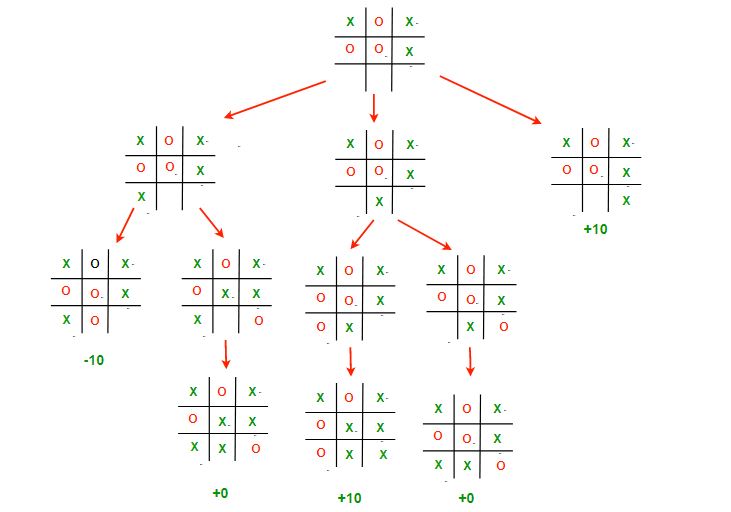Scintillating grid illusion explanation images are ready in this website. Scintillating grid illusion explanation are a topic that is being searched for and liked by netizens now. You can Find and Download the Scintillating grid illusion explanation files here. Get all free images.
If you’re searching for scintillating grid illusion explanation pictures information connected with to the scintillating grid illusion explanation topic, you have come to the right site. Our website frequently provides you with hints for downloading the maximum quality video and picture content, please kindly hunt and find more informative video content and images that match your interests.
Scintillating Grid Illusion Explanation. The classical explanation of the physiological mechanism behind the Hermann grid illusion is due to Baumgartner 1960. The illusion is named so because like stars in the night sky the dots appear to twinkle in and out of view. The illusion was first discovered in 1990 according to Indiana University Bloomington. This striking phenomenon may be referred to as the scintillating grid illusion.
 Scintillating Grid The Illusions Index From illusionsindex.org
Scintillating Grid The Illusions Index From illusionsindex.org
This illusion is known as the Scintillating Grid illusion. But why do they appear. The Scintillating Grid is a unique and fun illusion that tricks the eye and mind into thinking the dots change colors as you look around the image. In this illusion illusory dark spots areperceived as scintillating within the white discs. Baumgartner believed that the effect is due to inhibitory processes in the retinal ganglion cells the neurons that transmit signals from the eye to the brain. The scintillating grid illusion consists of bright discs superimposed on in-tersections of orthogonal gray bars on a dark background see Figure 1ASchrauf Lingelbach Wist 1997.
This optical illusion has actually been tricking humans brains for a long time.
The Scintillating Grid is a unique and fun illusion that tricks the eye and mind into thinking the dots change colors as you look around the image. Does it matter if you look directly at one of the black blocks vs. The illusion was first discovered in 1990 according to Indiana University Bloomington. It is constructed by superimposing white discs on the intersections of orthogonal gray bars on a black background. May 6 2016 by Caroline Latham. Invented in 1870 by the German physiologist Ludimar Hermann the original Hermann grid illusion consists of.
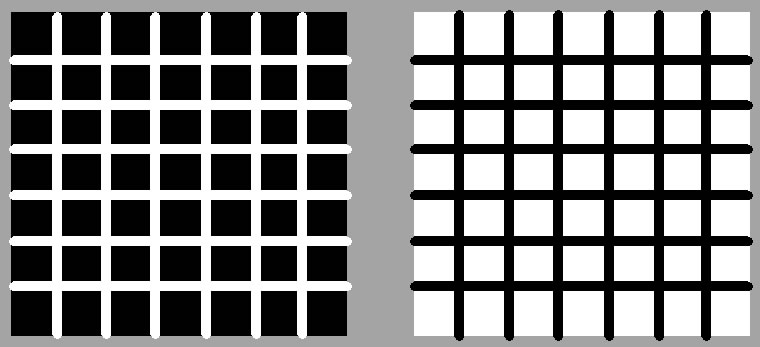 Source: abc-people.com
Source: abc-people.com
The Scintillating Grid is a unique and fun illusion that tricks the eye and mind into thinking the dots change colors as you look around the image. The Hermann grid optical illusion explained. The spatial and temporal properties of the illusion are well known but a neuronal-level explanation of the mechanism has not been fully investigated. If you keep your eyes directly on a single intersection however the dark dot does not appear. If the eye is moved very close to or very far away from the figure the phantom black dots do not appear.

If the eye is moved very close to or very far away from the figure the phantom black dots do not appear. The scintillating grid is a simultaneous lightness contrast illusion of a similar type to the Hermann grid although it was discovered over a century later by J. The scintillating grid illusion is an optical illusion discovered by E. Japanese professor Akiyoshi Kitaoka first share the photo on facebook. If the eye is moved very close to or very far away from the figure the phantom black dots do not appear.
 Source: illusionsindex.org
Source: illusionsindex.org
The spatial and temporal properties of the illusion are well known but a neuronal-level explanation of the mechanism has not been fully investigated. The spatial and temporal properties of the illusion are well known but a neuronal-level explanation of the mechanism has not been fully investigated. The scintillating grid illusion is an optical illusion discovered by E. Both answers lie in how the retina converts visual stimuli into electrical impulses. But why do they appear.
 Source: illusionsindex.org
Source: illusionsindex.org
The Scintillating Grid is a unique and fun illusion that tricks the eye and mind into thinking the dots change colors as you look around the image. Baumgartner believed that the effect is due to inhibitory processes in the retinal ganglion cells the neurons that transmit signals from the eye to the brain. At one of the intersections. This illusion is known as the Scintillating Grid illusion. Both answers lie in how the retina converts visual stimuli into electrical impulses.
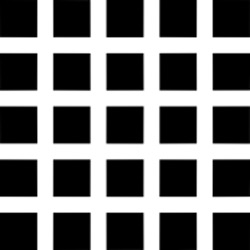 Source: daviddarling.info
Source: daviddarling.info
In this image do you see something other than black and white. Both answers lie in how the retina converts visual stimuli into electrical impulses. The effect seems to exist only at intermediate distances. A similar but more powerful illusion known as the Lingelbach illusionor the scintillating grid illusion was discovered in 1994 by Elke Lingelbach the wife of a German mathematics professor and has not yet been fully explained1Curiously the effect of the scintillation is lessened by tilting the head through 45. The Scintillating Grid Illusion was designed to try and cancel out the Hermann Grid effect but if you look really closely in the illusion above you might be able to make out faint white squares where the grey lines meet but not on the grey lines that arent intersecting.
 Source: rosslab.neurobio.pitt.edu
Source: rosslab.neurobio.pitt.edu
And why do they disappear as soon as you look directly at them. The effect seems to exist only at intermediate distances. It is constructed by superimposing white discs on the intersections of orthogonal gray bars on a black background. The scintillating grid is a simultaneous lightness contrast illusion of a similar type to the Hermann grid although it was discovered over a century later by J. At one of the intersections.
 Source: illusionsindex.org
Source: illusionsindex.org
In this image do you see something other than black and white. This illusion is known as the Scintillating Grid illusion. The spatial and temporal properties of the illusion are well known but a neuronal-level explanation of the mechanism has not been fully investigated. This striking phenomenon may be referred to as the scintillating grid illusion. When the viewer looks at the grid black dots begin popping up at the intersections creating a scintillating effect.
 Source: gpuzzles.com
Source: gpuzzles.com
May 6 2016 by Caroline Latham. Does it matter if you look directly at one of the black blocks vs. The illusion is known as the scintillating grid and was discovered by E. This optical illusion has actually been tricking humans brains for a long time. While there are really only black blocks and white spaces in the grid.
 Source: mathworld.wolfram.com
Source: mathworld.wolfram.com
The Scintillating Grid Illusion was designed to try and cancel out the Hermann Grid effect but if you look really closely in the illusion above you might be able to make out faint white squares where the grey lines meet but not on the grey lines that arent intersecting. This optical illusion has actually been tricking humans brains for a long time. May 6 2016 by Caroline Latham. This illusion is known as the Scintillating Grid illusion. Lingelbach in 1994 that is usually considered a variation of the Hermann grid illusion.
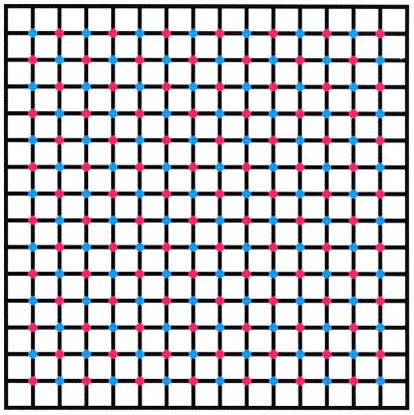 Source: abc-people.com
Source: abc-people.com
The scintillating grid illusion consists of bright discs superimposed on in-tersections of orthogonal gray bars on a dark background see Figure 1ASchrauf Lingelbach Wist 1997. A similar but more powerful illusion known as the Lingelbach illusionor the scintillating grid illusion was discovered in 1994 by Elke Lingelbach the wife of a German mathematics professor and has not yet been fully explained1Curiously the effect of the scintillation is lessened by tilting the head through 45. Lingelbach in 1994 that is usually considered a variation of the Hermann grid illusion. The Scintillating Grid Illusion was designed to try and cancel out the Hermann Grid effect but if you look really closely in the illusion above you might be able to make out faint white squares where the grey lines meet but not on the grey lines that arent intersecting. Abstract A stationary display of white discs positioned on intersecting gray bars on a dark background gives rise to a striking scintillating effectthe scintillating grid illusion.
 Source: researchgate.net
Source: researchgate.net
Disk-shaped luminance increments were added to the intersections of a Hermann grid consisting of medium grey bars on a black background. In this illusion illusory dark spots areperceived as scintillating within the white discs. This illusion is known as the Scintillating Grid illusion. Japanese professor Akiyoshi Kitaoka first share the photo on facebook. The spatial and temporal properties of the illusion are well known but a neuronal-level explanation of the mechanism has not been fully investigated.
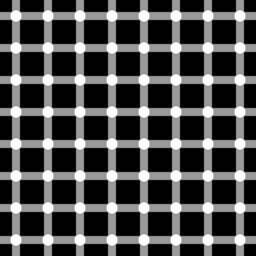 Source: daviddarling.info
Source: daviddarling.info
If the eye is moved very close to or very far away from the figure the phantom black dots do not appear. The spatial and temporal properties of the illusion are well known but a neuronal-level explanation of the mechanism has not been fully investigated. Both answers lie in how the retina converts visual stimuli into electrical impulses. The scintillating grid is a simultaneous lightness contrast illusion of a similar type to the Hermann grid although it was discovered over a century later by J. The Scintillating Grid Illusion was designed to try and cancel out the Hermann Grid effect but if you look really closely in the illusion above you might be able to make out faint white squares where the grey lines meet but not on the grey lines that arent intersecting.
 Source: rosslab.neurobio.pitt.edu
Source: rosslab.neurobio.pitt.edu
The Scintillating Grid Illusion was designed to try and cancel out the Hermann Grid effect but if you look really closely in the illusion above you might be able to make out faint white squares where the grey lines meet but not on the grey lines that arent intersecting. The Scintillating Grid is a unique and fun illusion that tricks the eye and mind into thinking the dots change colors as you look around the image. Disk-shaped luminance increments were added to the intersections of a Hermann grid consisting of medium grey bars on a black background. Several important prop-erties of the illusion have been discovered and reported inrecent years. The Hermann grid optical illusion explained.
 Source: illusionsindex.org
Source: illusionsindex.org
This optical illusion has actually been tricking humans brains for a long time. If the eye is moved very close to or very far away from the figure the phantom black dots do not appear. The illusion is known as the scintillating grid and was discovered by E. Making Sense of the Hermann Grid Illusion When viewing the Hermann Grid you will probably notice the faint dark spots that appear at the intersections of the white lines. Invented in 1870 by the German physiologist Ludimar Hermann the original Hermann grid illusion consists of.
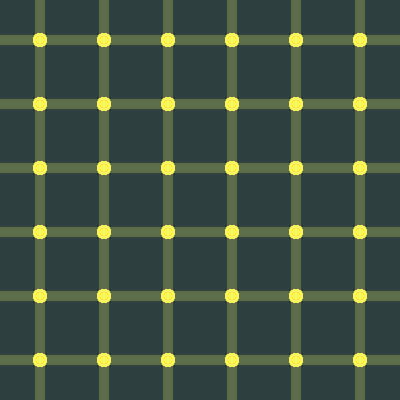 Source: abc-people.com
Source: abc-people.com
The spatial and temporal properties of the illusion are well known but a neuronal-level explanation of the mechanism has not been fully investigated. The Scintillating Grid Illusion was designed to try and cancel out the Hermann Grid effect but if you look really closely in the illusion above you might be able to make out faint white squares where the grey lines meet but not on the grey lines that arent intersecting. Does it matter if you look directly at one of the black blocks vs. The spatial and temporal properties of the illusion are well known but a neuronal-level explanation of the mechanism has not been fully investigated. And why do they disappear as soon as you look directly at them.
 Source: researchgate.net
Source: researchgate.net
Japanese professor Akiyoshi Kitaoka first share the photo on facebook. The scintillating grid illusion consists of bright discs superimposed on in-tersections of orthogonal gray bars on a dark background see Figure 1ASchrauf Lingelbach Wist 1997. The effect seems to exist only at intermediate distances. Japanese professor Akiyoshi Kitaoka first share the photo on facebook. When the viewer looks at the grid black dots begin popping up at the intersections creating a scintillating effect.
 Source: illusionsindex.org
Source: illusionsindex.org
Illusory spots darker than the background were perceived as flashing within the white disks with each flick of the eye. The illusion is known as the scintillating grid and was discovered by E. The scintillating grid is a simultaneous lightness contrast illusion of a similar type to the Hermann grid although it was discovered over a century later by J. And why do they disappear as soon as you look directly at them. This is something called a simultaneous light contrast illusion where the white dots are sometimes perceived as white and at other moments as black.

The classical explanation of the physiological mechanism behind the Hermann grid illusion is due to Baumgartner 1960. Invented in 1870 by the German physiologist Ludimar Hermann the original Hermann grid illusion consists of. Several important prop-erties of the illusion have been discovered and reported inrecent years. And why do they disappear as soon as you look directly at them. Disk-shaped luminance increments were added to the intersections of a Hermann grid consisting of medium grey bars on a black background.
This site is an open community for users to do sharing their favorite wallpapers on the internet, all images or pictures in this website are for personal wallpaper use only, it is stricly prohibited to use this wallpaper for commercial purposes, if you are the author and find this image is shared without your permission, please kindly raise a DMCA report to Us.
If you find this site beneficial, please support us by sharing this posts to your preference social media accounts like Facebook, Instagram and so on or you can also bookmark this blog page with the title scintillating grid illusion explanation by using Ctrl + D for devices a laptop with a Windows operating system or Command + D for laptops with an Apple operating system. If you use a smartphone, you can also use the drawer menu of the browser you are using. Whether it’s a Windows, Mac, iOS or Android operating system, you will still be able to bookmark this website.




